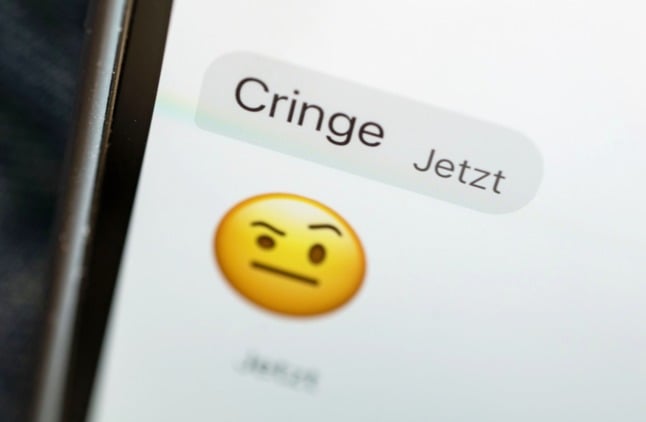Cringe has been chosen as Germany’s ‘Youth Word of the Year’ in 2021.
The terms ‘cringe’ and ‘cringey’ are used by younger Germans (and many other young people worldwide) to describe something embarrassing or awkward. They can also be used to express a sense of second-hand embarrassment.
The word won 42 percent in a final poll by Germany’s Langenscheidt publishing house, the company announced on Monday.
“The term is part of the active language use of 10 to 20-year-olds,” explained the publishing house, which has organised the vote since 2008. ‘Cringe’ snagged second place last year behind the word ‘lost’ – which is used to show that you or someone else is clueless or don’t know what to do.
READ ALSO: How did Germany’s 10 top ‘Youth Words of the Year’ originate?
Meanwhile, in the language of Goethe: "cringe" has been elected the "youth word of the year" in Germany, closely followed by "sheesh" & "sus," short for "suspect." #Fremdschämen https://t.co/4bd1auahno
— Bojan Pancevski (@bopanc) October 25, 2021
In the 2021 ranking, ‘sus’ – with 32 percent of the vote – and ‘sheesh’ – which one 26 percent – completed the top three words.
‘Sheesh’ expresses astonishment or incredulity and is used either before or after a sentence to dramatise what is being said. The word ‘sus’ is short for the English word ‘suspect’ , to describe something that doesn’t make sense or is suspicious.
According to Langenscheidt, a total of around 1.2 million young people took part in the vote, which was launched on June 14th.
Why is cringe the top word for young Germans?
Apart from being a generally great way to describe situations – especially for younger people who find almost everything cringe – it’s worth noting that many Germans enjoy speaking English and using English words.
This has grown in popularity in recent words thanks to things like social media and more access to English speaking TV shows.
English words and phrases are especially popular among younger people in Germany, and are often peppered into German sentences as slang.
Many of the top words from previous competitions have come from the English language. Previous winners have been ‘Smombie’ – a hybrid of ‘smartphone’ and ‘zombie’.
Artemis Alexiadou, a philologist at Humboldt University in Berlin, last year said the use of English words is also used by young people as a means of distancing themselves from older people.
READ ALSO: 10 ways of speaking German you’ll only ever pick up on the street
“Young people often add distinctive words or phrases to their spoken language to distance themselves from the older generation,” he said. “In that respect it makes sense to use English.”




 Please whitelist us to continue reading.
Please whitelist us to continue reading.
I’m done hearing “Suss” around the house.